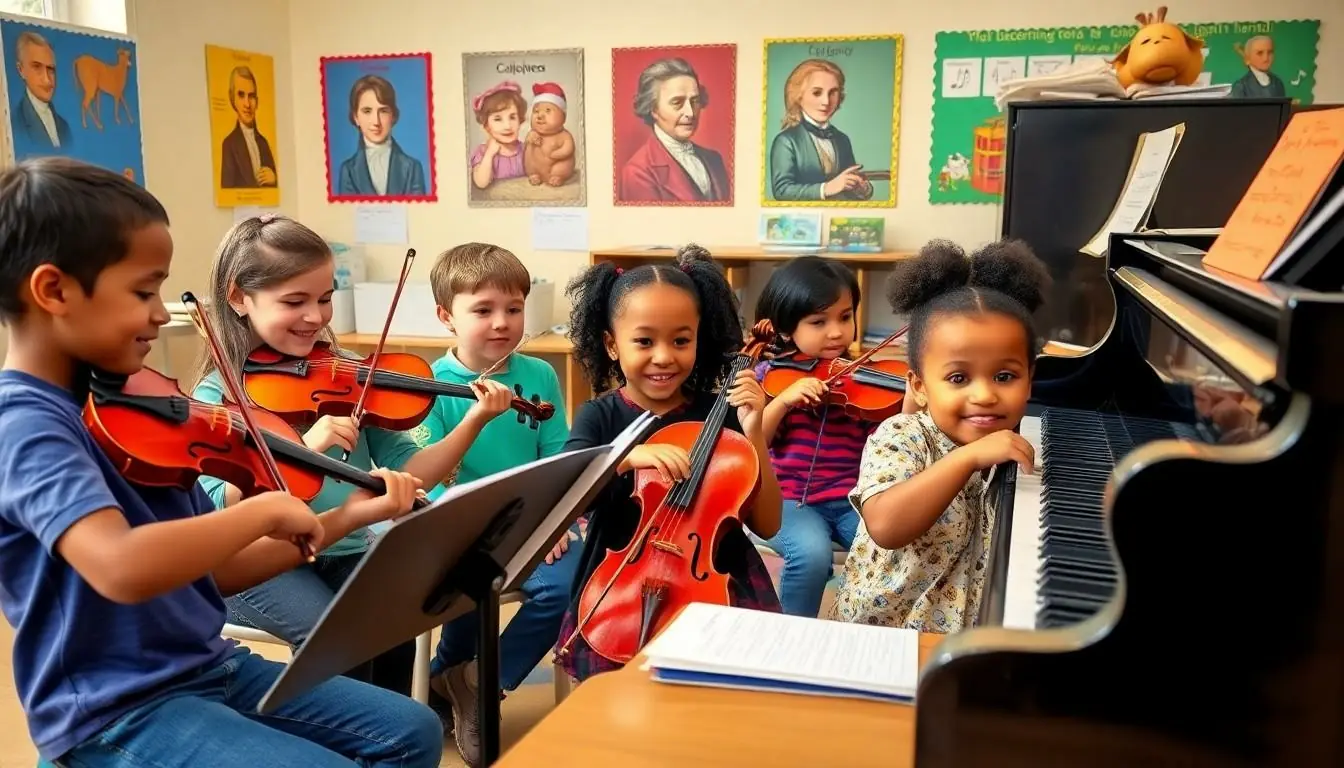Imagine a world where kids dance like nobody’s watching, all while soaking in the rich melodies of classical music. Sounds dreamy, right? Introducing children to classical music isn’t just about filling their ears with beautiful sounds; it’s about enriching their minds and sparking creativity. Who knew that a little Mozart could turn a mundane afternoon into an epic adventure?
Classical music offers a treasure trove of benefits, from improving concentration to boosting emotional intelligence. It’s like a secret superpower for little ones. So, why not swap the usual pop hits for a symphony of sounds that can inspire and uplift? By weaving classical tunes into their daily lives, kids can develop a love for music that lasts a lifetime. After all, what’s cooler than knowing a bit of Beethoven while your friends are still trying to figure out TikTok dances?
Table of Contents
ToggleWhat Is Classical Music for Children?
Classical music for children refers to pieces composed in the classical tradition, typically featuring orchestral instruments. This genre encompasses a wide range of works, from famous compositions by Mozart and Beethoven to contemporary classical pieces suitable for young listeners. Engaging with classical music can enhance cognitive development in children, as its complexity stimulates brain activity.
Listening to classical music may foster emotional awareness. The varied tempos and dynamics found in this genre allow children to experience different moods, leading to better emotional regulation. Musical elements like rhythm and melody contribute to children’s spatial-temporal skills, often linked to mathematics and problem-solving.
Parents can introduce classical music in various ways. Incorporating this genre during playtime or study sessions promotes focus and concentration. Concerts and interactive performances designed specifically for children can make classical music more accessible and enjoyable.
Various programs aim to familiarize children with classical music. Many educational institutions include music appreciation classes that expose students to iconic compositions. Media sources like PBS Kids and streaming platforms often feature curated playlists, making it easy to find age-appropriate selections.
Ultimately, strategic exposure helps children develop a deep appreciation for this timeless art form. By surrounding them with diverse classical pieces, parents cultivate an enriching environment that supports emotional and intellectual growth.
Benefits of Classical Music for Children

Classical music offers numerous advantages for children, significantly impacting both their cognitive and emotional development.
Cognitive Development
Engaging with classical music stimulates brain activity, enhancing cognitive skills. Research indicates that listening to complex compositions boosts memory retention and improves focus. Children exposed to classical pieces often exhibit higher problem-solving abilities. Their creativity flourishes as they learn to interpret different musical genres. Studies also show that early exposure to classical music can positively influence academic performance. Opportunities for children to explore various instruments deepen their understanding of music theory. This engagement enriches their overall learning experience.
Emotional Growth
Exposure to classical music aids in emotional awareness and regulation. Listening to diverse melodies allows children to explore and express their feelings. Emotions can be conveyed through different musical elements, helping kids better understand emotional nuances. Research links classical music with improved emotional intelligence. Regularly enjoying these compositions can reduce anxiety and promote relaxation. Children learn to connect music with personal experiences, fostering empathy. This connection enhances their interpersonal skills, crucial for navigating social situations.
Recommended Classical Music Pieces for Children
Listening to classical music can offer children an enriching experience. Here are several recommended pieces that can spark their interest and enjoyment.
Timeless Compositions
Mozart’s “Eine kleine Nachtmusik” captivates with its lively melodies. Beethoven’s “Symphony No. 9” introduces the famous “Ode to Joy,” fostering a sense of celebration. Tchaikovsky’s “The Nutcracker Suite” enchants through playful themes, perfect for sparking imagination. Vivaldi’s “The Four Seasons” varies with distinct moods in each movement, guiding children through different times of the year. Lastly, Saint-Saëns’ “Carnival of the Animals” features creative animal representations, appealing to young listeners’ love for storytelling.
Modern Interpretations
Contemporary composers create engaging adaptations of classical music. Anna Clyne’s works blend boldness and emotion, resonating with a younger audience. Eric Whitacre brings fresh choral pieces that inspire creativity. Additionally, the “Classical Kids” series presents famous composers in relatable stories, capturing children’s imagination. Organizations like Kidz Bop offer age-appropriate adaptations, making well-known classical pieces fun for kids. These modern interpretations emphasize how classical music remains relevant and engaging today.
Engaging Children with Classical Music
Engaging children with classical music offers enriching experiences. Parents can utilize various interactive activities and games to foster this engagement.
Activities and Games
Incorporating interactive games makes classical music fun. Musical chairs with classical pieces encourages movement. Rhythm clapping games using famous melodies improve timing skills. Drawing or coloring while listening to different composers enhances creativity. Storytelling sessions paired with classical soundtracks stimulate imagination. Organizing a mini-concert allows children to express themselves through performance. Each activity promotes engagement while boosting appreciation for classical music.
Listening Strategies
Developing effective listening strategies enhances the experience. Parents can start by playing short excerpts, encouraging focused listening. Discussing feelings or images inspired by the music enriches understanding. Creating a musical scavenger hunt allows children to identify instruments and themes. Involving children in selecting pieces empowers them and deepens interest. Establishing a routine for listening reinforces the habit. Practicing active listening focuses attention on the nuances of classical compositions.
Embracing classical music for children opens doors to a world of creativity and emotional growth. By integrating these timeless compositions into daily life, parents can nurture their child’s cognitive abilities and emotional intelligence. The rich tapestry of classical music not only enhances focus and memory but also fosters empathy and interpersonal skills.
As kids engage with various pieces through interactive activities and listening strategies, they develop a deeper appreciation for music. This journey into classical music can create lasting memories and instill a lifelong love for the art form. Ultimately, the benefits of classical music resonate far beyond the notes, enriching children’s lives in profound ways.
